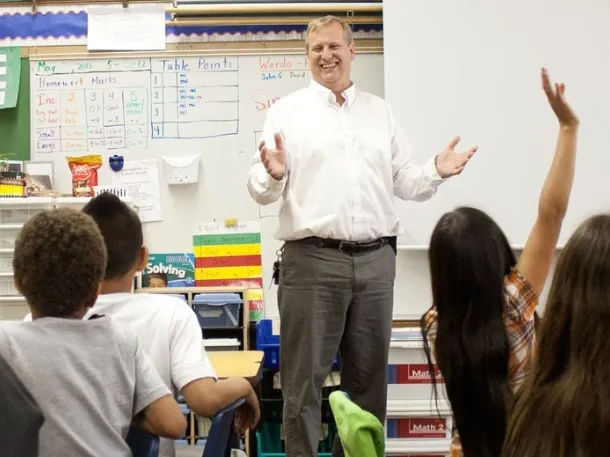- Home
- >
- APU Articles
- >
- News Article
Educating Students with Autism Spectrum Disorder
April 23, 2019 | Category Education | Written By Ashley Eneriz

As a teacher, you will regularly face new challenges with your students and classroom community, such as having pupils with diverse learning abilities. Now more than ever, the ability to educate students with autism spectrum disorder (ASD) and help them reach their full potential is a skill set every teacher needs.
Autism Needs Grow Each Year
Up through the 1980s, about one in every 2,000 children was diagnosed with autism, according to American Family Physician. Today, the Centers for Disease Control and Prevention estimate that one in every 59 children has been identified with ASD.
Craig Bartholio, EdD, chair of the Department of Special Education at APU, notes that the focus is now on educating students with disabilities alongside their peers in the K-12 setting as much as possible. Within schools today, students with disabilities such as ASD attend classes in their least restrictive environment, starting with the general education setting. “Gone are the days when children with disabilities were segregated into separate classrooms,” he said.
With this in mind, earning an education degree from Azusa Pacific University prepares future teachers to help all students, no matter their specific learning needs, achieve their best. “By preparing all teacher candidates to support the learning of future students with a broad spectrum of strengths and needs, we are providing them with the knowledge and expertise needed to affect change for all student learners, regardless of the funds of knowledge learners come to school with,” said Kathleen Bautista, EdD, assistant professor in APU’s Department of Teacher Education.
Seeing the Potential in Students with ASD
Every year, more children with autism enter the classroom. Accordingly, teachers need to understand the unique needs associated with educating students with autism spectrum disorder, and the strategies they can use to make a difference in pupils’ lives.
With the knowledge gleaned from master’s degree and credential coursework, educators can help each and every student—neurodivergent or not—reach their full potential. At Azusa Pacific, teacher preparation programs focus on inclusivity and advocacy for all students.
“As a university founded on Christian principles, we acknowledge that all students are made in the image of God,” Bautista said. “In this light, we prepare our teacher candidates, no matter which credential they seek, to meet the needs of all students, including those with identified disabilities.”
Bartholio noted that the foundation courses taught at APU are well suited for this vision. The curriculum intentionally focuses on the gifts and characteristics of students with disabilities—including autism—helping future educators to understand their unique needs.
Fulfilling Your Calling at Azusa Pacific University
Teaching is a calling, one that leads individuals along a career path that can affect countless other lives. With more than 25 programs for educators, APU has the right teaching degree for you.
For future teachers to be effective and influential in the classroom, they need to learn from effective teachers themselves. That is the difference in APU’s School of Education programs. All teacher candidates, no matter their credential type, take the six foundation courses, which are led by general and special education experts.
“The purpose of this partnership is to introduce the teacher candidates to the diverse needs of K-12 students in California,” explained Bautista. “Our teacher candidates begin learning about the characteristics of autism, along with other disabilities, during the first term of the program.”
Are you ready to make your calling as an educator a reality? Explore Azusa Pacific University’s world-ready teacher programs and find the right fit for you.